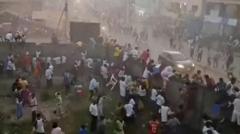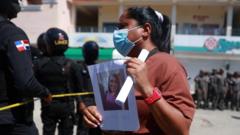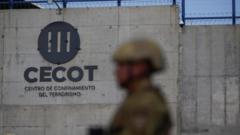On Sunday, a calamitous incident at a football stadium in Nzérékoré, Guinea, has resulted in the tragic loss of at least 135 lives, predominantly children, according to human rights groups. This figure starkly contrasts the government's official report of 56 deaths. The rights teams asserted that their estimates stemmed from a variety of sources, including feedback from hospitals, cemeteries, and eyewitness accounts. Additionally, they reported that over 50 individuals remain unaccounted for after the incident.
Tragedy Strikes as 135 Fans Reportedly Kill in Guinea Football Stadium Crush

Tragedy Strikes as 135 Fans Reportedly Kill in Guinea Football Stadium Crush
Human rights organizations report a staggering increase in fatalities following a catastrophic incident at a stadium in Guinea, raising concerns over crowd management and safety protocols.
In response, the military government has warned of strict repercussions for those spreading “unverified” information, while also announcing the initiation of a judicial inquiry to investigate the matter. Justice Minister Yaya Kaïraba Kaba indicated that individuals disseminating false information could face arrest and prosecution.
Witnesses described a chaotic scene during the match, particularly following what many deemed a controversial refereeing decision, which incited panic and led to violent clashes. Crowd control measures, including the deployment of tear gas, exacerbated the situation, especially since the stadium had only one small exit. Local rights groups held the game's organizers and the ruling military junta responsible, asserting mishandling of the crowd contributed to the disaster.
Prime Minister Mamadou Oury Bah has declared three days of national mourning in memory of the victims. Government spokesperson Ousmane Gaoual emphasized the need to respect the mourning period, acknowledging the provisional nature of the official death toll without denying the gravity of the situation.
Additionally, local journalist Paul Sakouvogi highlighted that the stadium was overcrowded, contributing to the tragic outcomes as thousands attempted to escape a single, narrow exit.
Guinea, like several other African nations, is currently under restrictions from hosting international football matches due to failure in meeting safety standards, according to the Confederation of African Football (Caf). This tragic event raises serious questions regarding the preparation and oversight involved in organizing large-scale events in a country suffering from governance issues.
As investigations proceed, many are calling for enhanced safety measures to prevent similar tragedies in the future.
Witnesses described a chaotic scene during the match, particularly following what many deemed a controversial refereeing decision, which incited panic and led to violent clashes. Crowd control measures, including the deployment of tear gas, exacerbated the situation, especially since the stadium had only one small exit. Local rights groups held the game's organizers and the ruling military junta responsible, asserting mishandling of the crowd contributed to the disaster.
Prime Minister Mamadou Oury Bah has declared three days of national mourning in memory of the victims. Government spokesperson Ousmane Gaoual emphasized the need to respect the mourning period, acknowledging the provisional nature of the official death toll without denying the gravity of the situation.
Additionally, local journalist Paul Sakouvogi highlighted that the stadium was overcrowded, contributing to the tragic outcomes as thousands attempted to escape a single, narrow exit.
Guinea, like several other African nations, is currently under restrictions from hosting international football matches due to failure in meeting safety standards, according to the Confederation of African Football (Caf). This tragic event raises serious questions regarding the preparation and oversight involved in organizing large-scale events in a country suffering from governance issues.
As investigations proceed, many are calling for enhanced safety measures to prevent similar tragedies in the future.



















